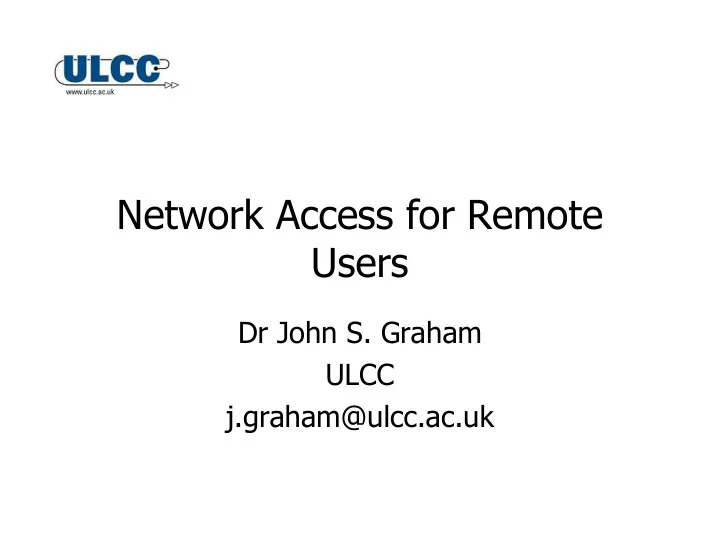

Network Access for Remote Users Dr John S. Graham ULCC j.graham@ulcc.ac.uk
Review of Technologies • Remote Site – Private Leased Lines • Kilostream or Megastream Circuits • LES – ISDN – EPS9 – ISP • Remote User – Private Dialup Service – ISP
Site-to-Site Private Infrastructure
Traditional Dialup Service � High Costs � Security Guaranteed � Support Burden � Limited to 56K Analogue Dialup � Limited Service
Virtual Private Network � Highly Flexible Solution � Complex Security Issues � Uses Existing Infrastructure
VPN Roadmap VPN Tunnelling Encryption Authentication IP Framework Symmetric Asymmetric Endpoints Data User
Tunnelling Methods • Layer III – GRE – IPSec • Layer II – L2F – PPTP – L2TP
Layer 3 Tunnelling (GRE) IP TCP Data GRE IP GRE IP TCP Data passenger protocol encapsulating protocol carrier protocol
Tunnelling In Action IP TCP Data IP GRE IP GRE IP TCP Data Source 62.49.38.138 Destination 194.82.103.186 192.168.17.26 192.168.17.26
Layer 2 Tunnelling (L2TP) PPP IP TCP Data L2TP IP UDP L2TP PPP IP TCP Data L2TP + IPSec IP ESP UDP L2TP PPP IP TCP Data ESP
Layer 2 Tunnelling Modes Compulsory L2 Tunnelling Voluntary L2 Tunnelling
Authentication • Peer Identity – Shared Secret – Digital Certificate • Data Integrity – Digital Signatures • User Identity – Kerberos – RADIUS
IP Security (IPSec) • Protocols – Authentication Header – Encapsulating Security Payload – Internet Key Exchange • Modes – Tunnel – Transport
IPSec Protocols Next Payload Reserved SPI Header Length SPI Sequence Number Sequence Number IV Authentication Data Data Pad Next Pad Length Header Authentication Data Authentication Header (51) Encapsulating Security Protocol (50)
IPSec Modes Tunnel Mode IP AH/ESP IP TCP Data Transport Mode IP AH/ESP TCP Data
Equipment at Remote Site • ‘Wires Only’ ADSL Connection – One Static IP Address • Splitter • Cisco 827H Router – Ethernet hub (4 ports) plus ATM port
Customer Installation
Router Configuration Ethernet B1 Routing Table Tunnel A1 B2 NAT IPSec A2 B3 Dialer
IPSec Followed by NAT • Immutable fields of outer IP header included in AH protocol’s ICV data. • Transport mode IPSec renders TCP/UDP checksums invalid. • Multiple incompatibilities between SA parameters and NAT. http://www.ietf.org/internet-drafts/draft-ietf-ipsec-nat-reqts-04.txt
Fragmentation Hell
http://www.ja.net/documents/
Recommend
More recommend